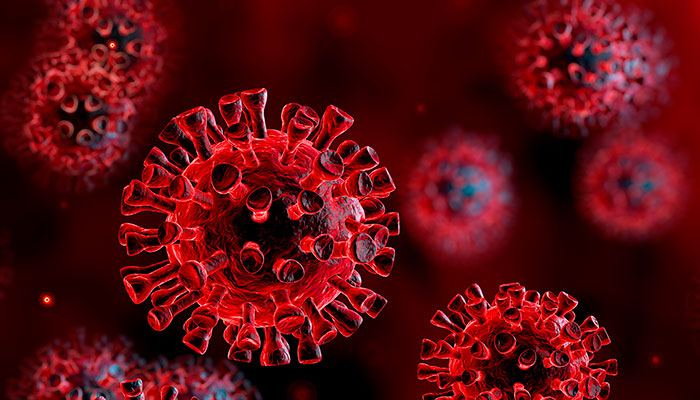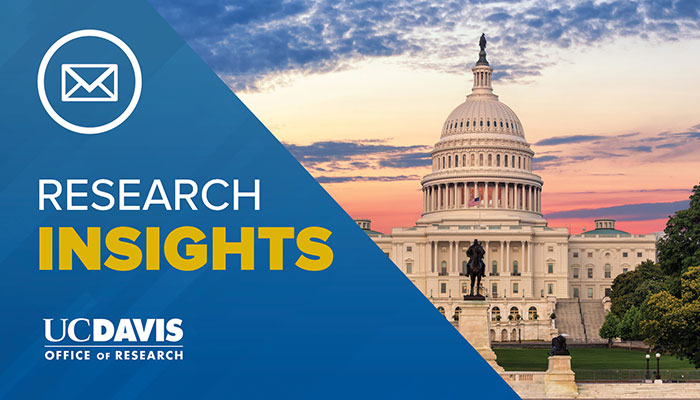Campus Guidance on Reducing On-Campus Research Activities Due to COVID-19 (March 17, 2020)
A Message from Vice Chancellor for Research Prasant Mohapatra to the UC Davis Research Community
I am writing to provide guidance for managing research activities during the COVID-19 pandemic. UC Davis remains open for research activities at this point in time, but we strongly recommend that on-campus research activities be adjusted and reduced where possible to minimize the spread and possible impact of the coronavirus. In addition, as local public health requirements are changing rapidly, we must prepare for the possibility of a complete cessation of on-campus, non-critical research on short notice, while maintaining critical systems. This guidance draws upon the actions taken at a number of top research facilities across the country and is in line with current UC and campus guidance.
It is important to stress two things. First, our goal is to minimize person-to-person interactions for all members of our community in order to limit the spread of the virus. This includes not only our researchers, but also the people who support our research, our research facilities, plants and our research animals and repositories. It further includes the general public with whom we interact in the course of getting to and being present at work. Second, this is not a shutdown of research at UC Davis. Rather, we hope and expect that much of the research we accomplish during this time period will be conducted remotely and that researchers will shift as much of their work as possible to electronic or other formats that reduce physical contact. However, we understand that several research activities have a need to be conducted on-campus or in off-campus physical facilities. Our goal is to reduce the number of people engaged in these research efforts and to do this by prioritizing the most critical activities in light of the current world situation.
Research at UC Davis is managed in a highly decentralized activity, and the means of conducting research varies widely across campus. Consequently, we are asking Principal Investigators (PIs), Deans, Research Unit Directors and Core Facility Directors to provide specific instructions tailored to the needs of their units and follow guidance within this document. Our office will continue to convene with these leaders on a regular basis. In this document we provide some broad guidance based upon evolving best practices at research institutions across the nation, and on feedback we have received to this point.
Based on the way things have played out in other regions of the globe, we should anticipate that the pandemic could last several months. We will continue to evaluate and communicate appropriate changes to this guidance based upon information from public health professionals, government officials, and university experts. Please plan for a protracted period of disruption and we will keep in regular contact. Also, as noted above, please prepare for the possibility that research may need to be fully stopped on campus on short notice.
General guidance
Our goal is to limit person-to-person transmission of the virus. Like many other top research universities, we believe that reducing on-campus staff levels to 10-15% of our normal level throughout the day (note: this can include undergraduate and graduate students if their in-person participation is deemed essential). Moreover, we should not only reduce presence, but wherever possible reduce occupancy to zero by limiting access. Note that this memo does not preclude the recording of laboratory experiments for remote lab courses. Those can proceed if done with 1-3 people involved and carefully ensuring adequate distancing, (six feet has been suggested by medical experts) and hygienic measures as discussed later in this message.
Researchers are expected to ramp down any non-critical on-site research activities at this time.
The applicable definition of critical research activities should include the following, but may be modified as needed by your Chairs, Directors, and Deans’ criteria:
- Research that must be maintained for the health and safety of human subjects
- Research for which discontinuation would generate data and sample loss that would be effectively irreplaceable.
- Maintenance of critical equipment and a safe standby mode of laboratories.
- Maintenance of critical animal populations and/or ensuring the ethical care and conduct of research with animal subjects.
- Maintenance and care of plant populations (includes immortal populations of trees, strawberries, etc.) that are hard to recreate and represent decades of research.
- COVID-19 research with a timeline relevant to the current pandemic.
Research personnel that can complete research work away from on-site laboratories or campus spaces (these includes our remote laboratories and facilities) should continue to do so. However, in-line with the above critical designation, there are some personnel that must continue to work on-site to adhere with the safety procedures in their Standard Operating Procedures (SOPs). We define these essential on-site research personnel as follows:
- Personnel necessary to ensure the ongoing viability of research, including the well-being of research animals, essential plant populations, as well as maintenance of research material that are perishable or not easily replaced
- Vivarium staff
- Non-vivarium lab staff responsible for animal care
- Faculty and/or research staff necessary to maintain research material that are perishable or not easily replaced. This could be primary cell lines or long-term experiments where there would be considerable cost and/or time associated with requiring the experiment to end prematurely (e.g., if there has been a continual one-month long experiment that requires regular measurements or maintenance to maintain, and if stopped, all previous data will be lost).
- Individuals responsible for maintenance of equipment that, if not done, could result in damage (e.g., cryogenic filling of NMR spectrometers).
- Researchers working on experiments that have a small window for completion. (For example, the ability to make a specific measurement only a few times a year)
- Clinical researchers where the health and safety of human research participants could be impacted should research activities cease (e.g., an individual participating in a study involving a drug or device who must be monitored due to such use)
We recommend that teams critical to maintaining operations be divided into two or more fixed member groups. This will ensure continuity of critical functions should a single team member no longer be able to participate due to illness, and avoid potentially leading to all members of the team having to stop work. If critical operations rely on a single individual, contingency plans must be developed. Where possible, written operational procedures should be documented, and cross training of personnel may need to be accelerated. In the worst case, shutting down operations may be required.
Labs should consider their supply chains particularly where critical supplies may be sole-sourced or come from regions that are hit hard by COVID-19.
In addition, we are aware of many of the concerns regarding salaries and career advancement of graduate students, post-docs and junior faculty who depend on laboratory research. Although further information will be forthcoming, we anticipate considerable accommodation from the university and funding agencies. For example, in regard to salaries, NIH recently circulated the following information:
- Salaries: NIH understands that many researchers may be unable to work as a result of or related to the effects of COVID-19. If a recipient organization’s policy allows for the charging of salaries and benefits during periods when no work is performed due to the effect of COVID-19, regardless of the funding source, including Federal and non-Federal, then such charges to NIH grant awards will be allowable. Reminder: NIH awarding Institutes/Centers (ICs) may request documentation to confirm the requirements of institutional policies.
- NIH FAQs here suggest that some supplemental support may be available: https://grants.nih.gov/faqs#/covid-19.htm?anchor=question55763
Additional guidance
- Even with reduced staff density of 10-15% of normal operations, all labs must implement social distancing and other best practices and develop individualized work plans that minimize close contact and maintain clean air and surfaces. Until more is known, care should be taken in rotating personnel in and out of labs, particularly in light of recent research on COVID-19 survival in air and on surfaces.
- Individual PIs should enable students, postdoctoral researchers, and research staff to work from home as much as possible.
- Human subjects research studies involving immunocompromised or elderly at-risk participants or research involving group meetings or appointments should delay or use alternative interactions via electronic means whenever possible. These modifications may be implemented prior to IRB approval when it is necessary to eliminate apparent immediate hazards to the participant. Critical research that requires face-to-face
interaction with participants can continue to ensure a participant’s health and safety (e.g., some clinical trials). Virtual interaction with human participants is permitted (e.g. by Zoom, phone, or other means). NIH has issued guidance outlining the options available to recipients conducting NIH-funded clinical trials and human subject studies – that are impacted by the declared public health emergency for COVID-19. The IRB has implemented flexibility in modifying protocols to accommodate for pandemic impacts. /research-continuity-planning-for-covid-19/#guidance-active - One consequence of the scaled back activity on campus and our remote work regimen is that we will need to make sure that spaces and valuables are secured. Campus Security is aware of this concern and will be taking appropriate measures.
- PIs must work with their respective Department Chairs and Research Unit Directors to develop a scale-back plan by Friday, March 20. At this point we are not offering specific recommendations for what individual scale-back plans should look like, as many Lab Directors and Department Chairs have already begun soliciting these plans. All plans should be consistent with UC and UC Davis policies, especially those of EH&S, and the guiding principles expressed in this document. We encourage you to collaborate with colleagues to share best practices as your plans evolve.
- The animal care program will be instituting the following changes effective March 18. All animal orders and intra-campus transfers will be limited to ongoing research demands and imports and exports will be postponed. Breeding of research animals should be decreased and we strongly recommend investigators seek protection of critical lines by cryopreservation or other means. Research related activities should be limited to those essential for ongoing studies and no new studies should be initiated. Daily husbandry practices are expected to continue per standard operating procedures although weekly and monthly duties may be delayed.
- We recognize the childcare hardships brought on by closing of schools and daycare. For safety reasons, minor children are not allowed in laboratories.
The Office of Research will remain open with many staff working from home. Our expectation is to remain fully operational, albeit with potential delays as we adjust to increased remote working. We have provided a website with links to additional sponsor notices, information and checklists that may prove helpful to you during this ramp-down time and moving forward.
Further guidance will be provided as it becomes available. With your help, we will navigate this challenging time.
Sincerely,
Prasant Mohapatra
Vice Chancellor for Research







